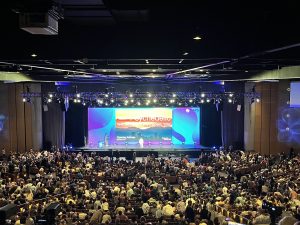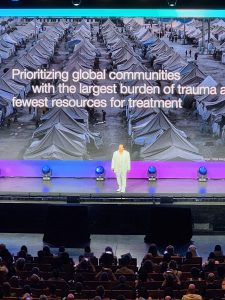The largest convening relating to psychedelics anywhere in the world at any point in known history took place at the Colorado Convention Center from June 19-23. With a few weeks to integrate the immensity of the experience, I have some personal and professional reflections to share:
- The multi-disciplinary and cross-sector nature of the psychedelics “space” (it transcends an industry, sector, or movement) is truly historic and potentially ground-breaking in its capacity to accommodate and balance the moral,
 ethical, and practical considerations at play: benefit and resource sharing with indigenous source, therapeutic, medicinal, regulatory, racial justice, capital, community, religious, mystical, and many more. The prevalence of Public Benefit Corporation form among active commercial ventures at such an early phase of the “space” demonstrates an early commitment to stakeholder interests and balancing public benefit alongside profit. Only time will tell if this commitment endures where the stakes are high and in the M&A deals that are sure to take place. There are several companies in the psychedelics space that have made irrevocable pledges to not enforce patents, and to engage in benefit sharing by committing a percentage of equity proceeds with foundations and BIPOC communities, from which many psychedelic traditions emerged and to which the most reparative efforts are owed (due in no small part to the racist war on drugs).
ethical, and practical considerations at play: benefit and resource sharing with indigenous source, therapeutic, medicinal, regulatory, racial justice, capital, community, religious, mystical, and many more. The prevalence of Public Benefit Corporation form among active commercial ventures at such an early phase of the “space” demonstrates an early commitment to stakeholder interests and balancing public benefit alongside profit. Only time will tell if this commitment endures where the stakes are high and in the M&A deals that are sure to take place. There are several companies in the psychedelics space that have made irrevocable pledges to not enforce patents, and to engage in benefit sharing by committing a percentage of equity proceeds with foundations and BIPOC communities, from which many psychedelic traditions emerged and to which the most reparative efforts are owed (due in no small part to the racist war on drugs). - It is still early times for the active practice of law with psychedelics ventures, but it is just the right time for psychedelic lawyering. State-level decriminalization (only in Colorado at present) may be only a few months old, but the need and actual practice of mindful, human-centered and integrative lawyering is here…now.
- The contours and channels by which the psychedelic space will become commercialized or mainstreamed are not at all yet clear. Based on poignant and clear presentations by the Psychedelic Bar Association, there are four primary channels through which the psychedelics sector will require legal support:
- Pharma/Biotech – through the patent-based system seeking FDA approval for certain medicine protocols. This is the path MAPS is pursuing for MDMA-assisted therapy for PTSD, and others for Psylocibin for treatment resistant depression and severe depression. Note that at present MDMA and psylocibin are still defined as Schedule I drugs under the Controlled Substances Act.
- Religious Freedom Restoration Act. Following the Uniao do Vegetal and Santo Daime victory before the U.S. Supreme Court, many have attempted to follow a similar playbook of seeking RFRA protection for psychedelic-related religious use. This is at best a flawed and limited avenue for seeking legal protection for conduct otherwise subject to the Controlled Substances Act.
- Regulated therapeutic system. Currently only available in Oregon, regulated systems of natural medicine therapy are a novel state-based approach to proving legal healing modalities involving psychedelic compounds such as psilocybin. Colorado is currently devising rules under the Natural Medicine Health Act, which should be released later in 2023, for implementation in early 2024. This system contemplates state licensing for healing centers, facilitators, cultivators, testing facilities and others involved in the provision of medicine healing. Note that at present the compounds to be available under these regulated regimes are still defined as Schedule I drugs under the Controlled Substances Act. Services contemplated under regulated therapy regimes will require licensing, the guidance for which is not yet available.
- Decriminalized personal use. Colorado is the only state in the U.S. to adopt a two-prong approach to natural medicine at the same time. Colorado simultaneously authorized the creation of a regulated therapeutic system (like Oregon) and decriminalized the possession, use, cultivation and gifting to persons 21 of age and older of psilocybin (and later other natural medicines such as ibogaine, DMT, non-peyote mescaline). Note that while certain conduct that has been decriminalized under applicable state law, it is still regulated or criminalized under federal law. Further no payment may be made for the provision of natural medicines. You should consult an attorney in your jurisdiction.
*At present there is no case law, and no regulations or guidance as to what differentiates legal gifting of psilocybin in association with compensated bona fide therapy services from the required licensing of natural medicine facilitated therapy. This will be an area of emergent legal development in the coming years.

- The need for widely available safe and effective healing modalities and therapies for a range of conditions is acute. Further, this need transcends the currently available channels for healing delivery. New channels will include community-based healing and integration, hybrid medical and facilitated therapies, and multi-modal and holistic therapy practices. Many of these enterprises will require innovative legal structures, such as public benefit corporations and cooperatives. This is where our Healing Law practice is uniquely positioned to add value and protect values and mission.
- Last but not least, the human beings and their creations in this space are overwhelmingly beautiful and spirited. The artistic creations that occupied and enriched the conference were a real highlight. They fostered a deeper sense of meaning and beauty. The art was multi-sensory and a great energetic complement to the frenetic energy of the exhibition space.
From the perch of our exhibition booth , we met thousands of interesting people who are boldly endeavoring to create the future of healing and psychedelic therapy and community.
With so much excitement coming from the emerging field of psychedelics, we are all reminded to tread carefully, cautiously, and slowly. Guided by the recent history of suppression and fear, I hope for the prevalence of rigor, authenticity, courage and ethical conduct over haste or hype.
